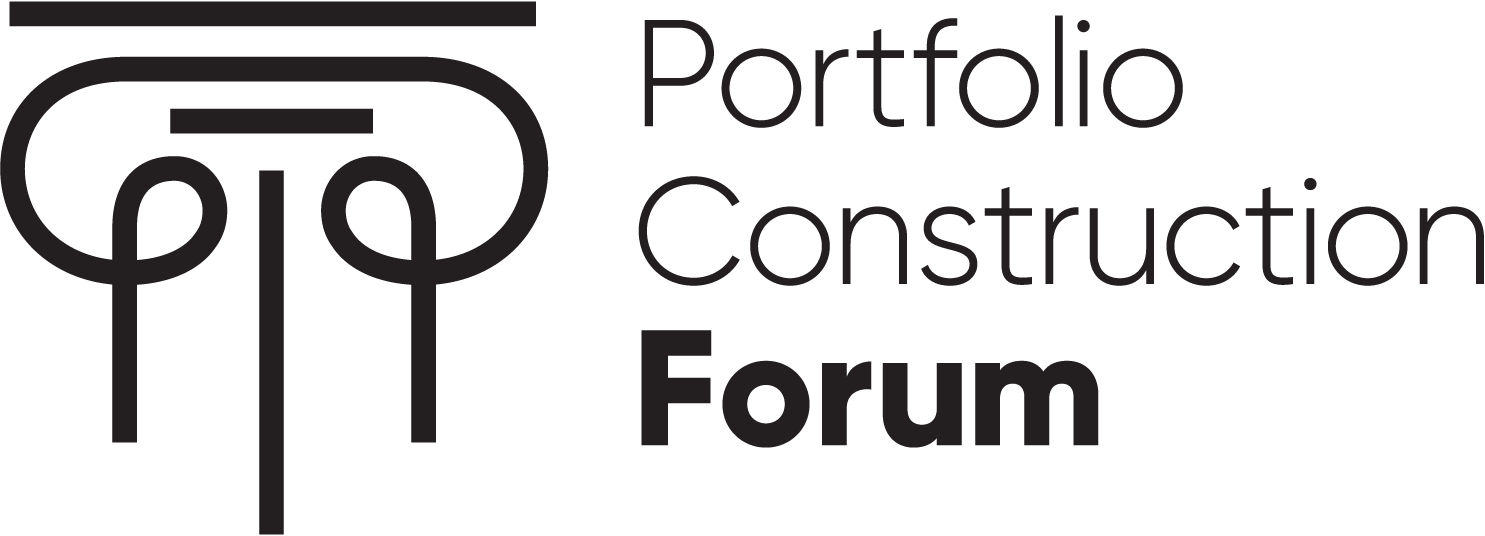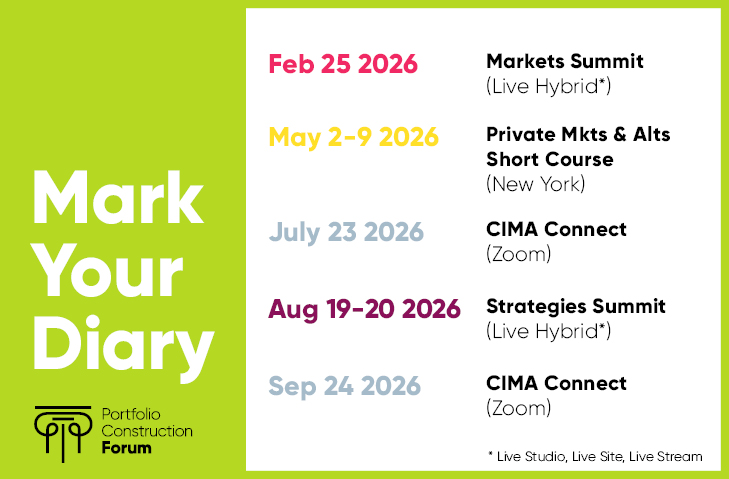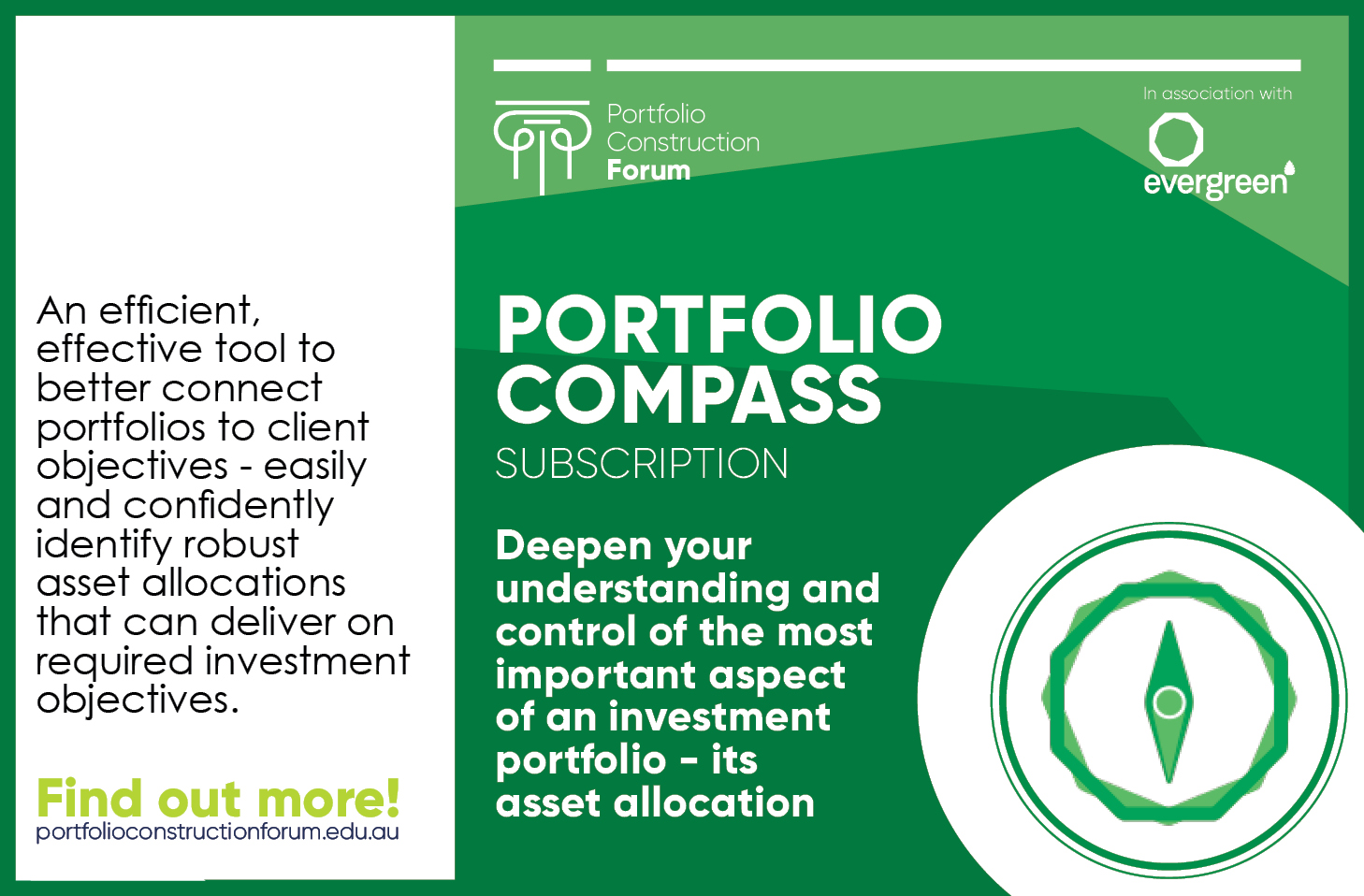
Debating principles to inform defensible investing
Crises can be useful – highlighting our investing strengths and weaknesses. What we do with this information determines whether portfolios survive or thrive during the dislocation and in the post-crisis environment.
The live and on-demand All Things Considered zoominar series explores and challenges the paradigms and assumptions underpinning our investing activities, focusing on those most consequential to investment outcomes.
All Things Considered will challenge your portfolio construction beliefs, helping you identify which remain valid and which require new thinking, to inform your investing knowledge, beliefs and behaviours and help you build better quality investor portfolios.
Mark Your Diary! All Things Considered 2021 (12, 19, 25 Nov and 03 Dec 2021). Meanwhile, “attend” All Things Considered 2020 online!
Graham Rich
Dean, Portfolio Construction Forum
QUICKLINKS
Overview Aim; Most suited to; CE/CPD Accreditation; Cost
About the program Introduction; Recent past programs
Have your say Have your say - which assumptions underpinning our investing activites are in greatest need of revision?
Overview
Aim
All Things Considered will help you identify which of your portfolio construction beliefs remain valid after being challenged by yet another crisis and which require new thinking, to inform your investing knowledge, beliefs and behaviours and help you build better quality investor portfolios.
Most suited to
All Things Considered is suited to all Portfolio Construction Forum members.
It is especially suited to those whose primary day-to-day role is focused within the spectrum of issues involved in designing and building investment portfolios using (but not necessarily limited to) managed funds from a range of firms - so that includes:
- investment advisers, researchers/analysts and portfolio managers from private wealth management companies;
- fund analysts and asset consultants from fund research and fund investment consulting firms;
- fund researchers/analysts and portfolio managers from multi-manager funds management, superannuation, and investment platform companies; and,
- funds management professionals who work with the above individuals.
CE/CPD Accreditation: 1 CE hour per zoominar
By attending an All Things Considered zoominar in full, you earn 1 CE hour that can be used to help meet the CE/CPD requirements of 20 governing bodies (regulators, associations and institutes - including ASIC, APRA, FASEA, AFA, SMSFA, FPA and CIMA® CE/CPD requirements, to name a few.
Cost: $0
All Things Considered is complimentary ($0) for all Portfolio Construction Forum members.
ABOUT THE PROGRAM
Introduction
The Forum’s subject matter focus is on five Knowledge Domains – Philosophy, Markets, Strategies, Investing and Finology. All Things Considered is focused primarily on our “Philosophy” knowledge domain:
Philosophy - understanding principles to inform defensible investing knowledge, beliefs and behaviours
A defensible investment portfolio construction philosophy is grounded in a thorough understanding of core investment principles (theories), gained through an evidence-based and critical way of thinking to develop and continuously evolve investing knowledge which, influenced by biases, informs investing beliefs and enables consistent, defensible investing behaviours.
All Things Considered is designed and curated by our specialist, experienced and independent team. It features a Faculty of leading investment thinkers - experienced and expert multi-manager portfolio construction practitioners, investment managers and strategists, academics, and independent consultants - each offering his/her best, high conviction ideas on an accepted investment paradigm or assumption that they believe requires new thinking.
RECENT PAST PROGRAMS
All Things Considered… we do not know what we do not know | July 2020 | 1 CE/CPD hr
We make automatic assumptions on a daily basis. A critical assumption is that our pre-Covid-19 pandemic investment management toolkit will remain relevant in the future. Questioning our assumptions is fundamental to ensuring long-term, sustainable investing success - but it is challenging. People living in a system often cannot conceive of a different world. Yet the Covid-19 pandemic has created a global health and economic crisis that is unprecedented in speed, breadth, scope and reaction - and there is a growing realisation that this IS a whole new world.
The first All Things Considered webinar is foundational. Our panel of expert portfolio construction practitioners and academics make the case for questioning our investing activities, and identify some of the “sacred cows” that are most consequential to investment outcomes AND in greatest need of revision.
All Things Considered… market pricing | August 2020 | 1 CE/CPD hr
Market pricing goes to the heart of everything we do in constructing portfolios. But the risk-free rate is artificial due to central bank manipulation of interest rates to stimulate economies, which has a flow on effect on the pricing models we all use. If we look at absolute levels, equities look amazingly cheap relative to the risk free rate. If we look at relative levels i.e. history, then the norm is about 5% for the equity premium and so equities now look super expensive. That’s the real dilemma that investors have today - are we to look at asset classes relative to their history, or are we to look at them relative to cash which has been manipulated by central banks? The implication for asset allocation is significant. As a starting point, the case for cash and bonds in portfolios is significantly diminished.
All Things Considered… the next big shock | August 2020 | 1 CE/CPD hr
Who would have thought that a health crisis would create such a significant financial and economic crisis? To properly manage systemic risk in our portfolios, we need to ask ourselves, where is the next big shock coming from?
The World Economic Forum Global Risks Report released in January 2020 identifies the biggest systemic risks we face over the next 10 years. Infectious disease was rated high in terms of impact, but low in likelihood - so perhaps we can be excused for not positioning portfolios for something like Covid-19.
But, the five highest probability risks - by likelihood and impact - are climate action failure, extreme weather, biodiversity loss, water crises and cyber attacks. All five were rated as far more likely and of higher impact than asset bubbles, inflation, fiscal crises, etc. So there are high probability, high impact, non-financial risks that we know about today.
Why don’t we spend more time thinking about how we factor them into our investment strategies?
Watch on-demand soon
All Things Considered… benchmarks and our objectives | August 2020 | 1 CE/CPD hr
We assume that benchmarks are relevant to our objectives, ignoring their initial construction and evolution over time. Why should we be comfortable with the duration and counterparty exposures inherent in bond benchmarks?
Typically, the role of fixed income in a portfolio is to diversify against equity risk, to provide some form of protection. Doubling that protection by doubling the duration of a portfolio, without actually investing any more capital, sounds like a good deal. So why do we accept the duration of the benchmark at all? Don’t we also want credit risk to be as diversified as possible, rather than systematically skewing the concentration of credit risk towards the most indebted counterparties, which is exactly what using the market cap index as a benchmark forces us to do.
We should structure our fixed income portfolios markedly differently. And the same applies more broadly.
- Graeme Miller, CIMA®, Chief Investment Officer, Telstra Super (Sydney)
- Joe Fernandes, PhD, Principal and Founder of GQF Group (Sydney)
- Anne Anderson, Managing Director and Head of Fixed Income & Investment Solutions Australia, UBS Asset Management (Sydney)
- Robert Prugue, Principal Consultant, Callidum Investment Research (Sydney)
Watch on-demand soon
All Things Considered… a defensible philosophy | September 2020 | 1 CE/CPD hr
As investors we have a tendency to remember our victories and gloss over our failures - and to apply those perspectives to today’s investment decisions. A robust investment philosophy helps protect us against making reactive investment decisions that can have an adverse impact on the long-term outcome of a portfolio. But a robust framework is not enough. Investment processes must be flexible enough to shift with changing paradigms, to avoid introducing unintended risks into portfolios.
Those with a clearly articulated and defined investment philosophy and framework are better able to overcome our human tendencies, and successfully navigate treacherous conditions such as those experienced in 2020.
- Veronica Klaus, General Manager - Investment Consulting, Lonsec (Sydney)
- Chris West, CIMA®, GAICD, Chief Investment Officer, WA Super (Perth)
- Tim Farrelly, Principal, farrelly’s Investment Strategy (Sydney)
- Annika Bradley, CIMA®, Director, Lodrino (Brisbane)
- Joe Fernandes, PhD, Principal and Founder. GQF Group (Sydney)
- Rob Prugue, Principal Consultant, Callidum Investment Research (Sydney)
- Maroš Servátka, PhD, Professor of Economics, Macquarie Graduate School of Management (Sydney)
Watch on-demand soon
Join the debate
What’s your view? Which assumptions underpinning our investing activites are in greatest need of revision? Answer the question and see how your view compares to others. A full list of suggestions underlying each of these topics is below.







